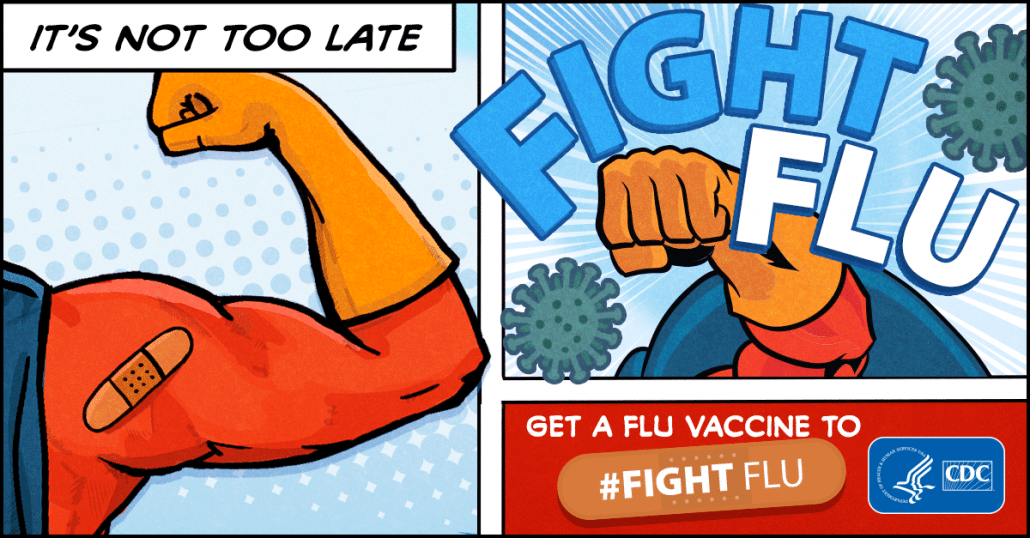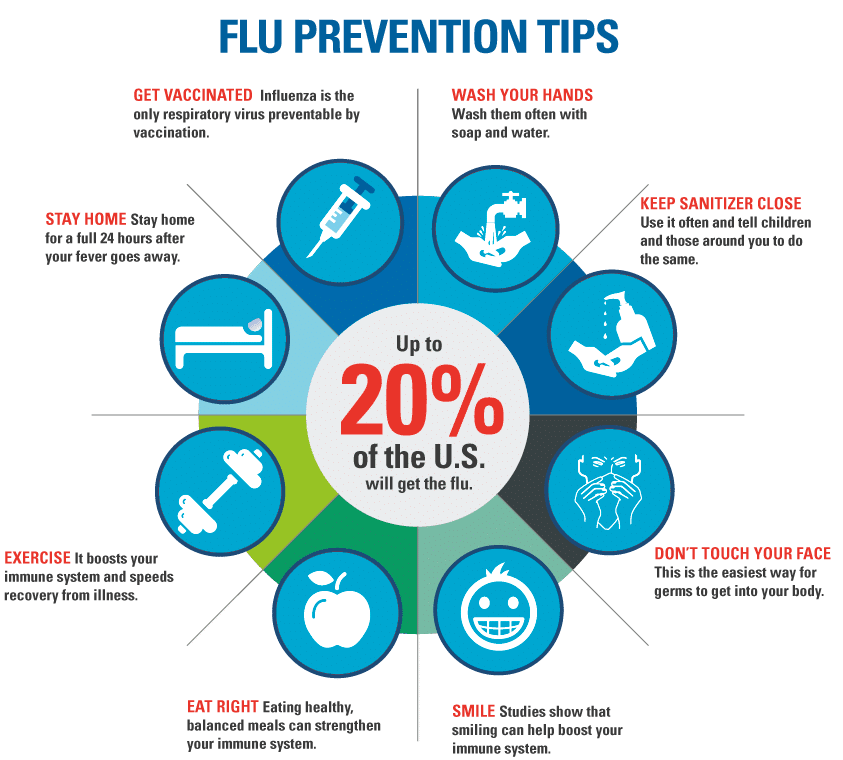Winter Months Are Here: Don’t Be Blue, Prevent the Flu!
By: Tessa Gilliland
It’s the kick off for National Influenza Vaccination Week! National Influenza Vaccination Week is the first week in December, Dec. 2 – Dec. 8, which opens an opportunity for the healthcare community to promote the influenza vaccination, or more commonly known, the flu vaccine. It is at the beginning of December to encourage the nation to get vaccinated against the flu before peak flu season begins.
The Center of Disease and Control (CDC) advocates for everyone to get protected from the flu by getting a vaccination. The flu vaccination covers several different strains of influenza. The recommendation of receiving the vaccine is as soon as possible, and it is better to get vaccinated regardless of how late in the flu season it is (CDC).
CAUSES
There are many causes of the flu. The flu virus can travel through the air in droplets, from infected people when they cough, sneeze or talk. If there are airborne particles they can be inhaled, or land on everyday objects, which can later transmit the flu upon touching them.
WHAT IS THE FLU?
The flu is a contagious respiratory illness that infects the nose, throat and lungs. It is a mild to severe illness, but in extreme cases, can lead to death (AAP). The flu may sound like a bad cold, but it is far worse than the common cold, and can worsen to more serious and severe health conditions. Symptoms typically take a day to show, causing infected people to spread the virus without knowing. There are multiple symptoms that a person with the flu can exhibit. Symptoms include:
- • Fever
• Cough
• Sore throat
• Runny or stuffy nose
• Muscle and body aches
• Headaches
• Fatigue
• Vomiting and diarrhea, which are more common in children rather than adults
If someone has the flu, it typically clears up in a few days, although it can last up to two weeks. However, in some cases with the flu, it can worsen into moderate or severe complications. The flu can develop into pneumonia, sepsis, inflammation in the heart, brain, or muscles, as well as sinus and ear infections (CDC). Most flu symptoms go away after a week or two, and most do not have complications, but people who are at higher risk are more likely to have their flu develop into complications. There is a higher risk for developing the flu for young children, pregnant women, people 65 years or older, people who suffer from chronic health conditions and people who have certain living and working conditions (Mayo Clinic).
During the 2017–2018 flu season, over 49 million people suffered from the flu virus. Those cases led to 960,000 hospitalization visits. Over 79,000 deaths were reported from the flu (CDC).

Fight the Flu
FLU WARNING SIGNS
There are many different signs that someone with the flu will show. They differ from the symptoms and differ depending on the age and health status of the individual (CDC).
Children will typically exhibit the following:
- • Fast breathing or trouble breathing
• Bluish skin color
• Not drinking enough fluids
• Not waking up or not interacting
• Being so irritable that the child does not want to be held
• Flu-like symptoms improve but then return with fever and worse cough
• Fever with a rash
Adults have slightly different warning signs:
- • Difficulty breathing or shortness of breath
• Pain or pressure in the chest or abdomen
• Sudden dizziness
• Confusion
• Severe or persistent vomiting
• Flu-like symptoms that improve but then return with fever and worse cough
WHO IS AT RISK?
Since the flu is a contagious respiratory disease, it can affect everyone. However, there is a higher risk for young children, pregnant women, people 65 years and older as well as people with chronic health conditions. Some chronic health conditions that make someone more susceptible to developing the flu include people with asthma, diabetes, heart disease and lung disease (CDC). Living and working conditions can also make an individual more susceptible to developing the flu, such as people who interact with a lot of people on a daily basis such as people in nursing homes, in the military, etc. Anyone with a weakened immune system is also at a higher risk of developing the flu. Obesity can increase the risk of complications with people who are affected with the flu (Mayo Clinic).

Flu Prevention Tips
TREATMENTS FOR INFLUENZA
Most people who fall ill with the flu often do not need medical treatment. It is best to stay at home and to avoid contact with other people, as the disease is contagious and spreads easily. It is advised to rest and drink plenty of fluids. Take everyday precautions to help prevent the spread and development of the flu. Some simple precautions include limiting contact with others if one is sick.
- • Always covering nose and mouth with a tissue while sneezing or coughing, then properly discarding the tissue into the trash afterwards.
• Keeping hands clean by always washing them with soap and water, if that is not available, then the use of alcohol-based hand sanitizer.
• Cleaning and disinfecting common objects that can hold germs or bacteria like the flu is another great way to stop the spread of it (Mayo Clinic).
People who fall into the high-risk category who develop the flu, or infected people who are extremely sick should seek medical attention. In some cases, a medical provider will prescribe antiviral medications.
BENEFITS OF THE FLU VACCINE
There are multiple benefits of receiving the flu vaccination. The vaccine protects recipients from getting sick from the flu. In the 2016–2017 flu season, the vaccination prevented well over 5.3 million cases of the flu, as well as 2.6 million medical visits with more than 85,000 hospitalizations. Not only does the flu vaccination lower the risk of developing the flu, but it has also shown to lower the rates of cardiac events, as well as medical visits for people with diabetes and chronic lung diseases. It has also been proven to help protect women during and after pregnancy, as well as being a life-saving vaccination for children (CDC).
The flu vaccination is available in a nasal spray as well as a shot. It is back this year as a nasal spray. The past two years the nasal spray has not been available due to the question of the lack of effectiveness. This years’ version of the nasal spray is effective. However, the nasal spray is not recommended for pregnant women, children 2- to 4-years-old with asthma and people with compromised immune systems (Mayo Clinic).
REDUCE THE RISK
The easiest way to avoid getting the flu and developing severe complications is to get a flu vaccination. The earlier the better, but it is recommended to get a vaccination later in the season than to not get one at all. It is recommended for everyone six months and older.
Influenza is a very common contagious respiratory illness with bad symptoms, which can lead to severe complications. To schedule an appointment with a healthcare provider to get a flu shot, please contact AxessPointe Community Health Centers, Inc. today. For a full list of medical services, visit: https://axesspointe.org/medical-services/. Call us at (888) 975-9188 to schedule an appointment!
REFERENCES
Achdalpha. “National Influenza Vaccination Week.” ACHD, 19 Dec. 2014, www.achd.org/national-influenza-vaccination-week-2/.
“Influenza (Flu).” Centers for Disease Control and Prevention, Centers for Disease Control and Prevention, 7 Nov. 2018, www.cdc.gov/flu/resource-center/nivw/about.htm.
“Influenza (Flu).” Mayo Clinic, Mayo Foundation for Medical Education and Research, 20 Sept. 2018, www.mayoclinic.org/diseases-conditions/flu/symptoms-causes/syc-20351719.
“National Influenza Vaccination Week.” Immunizations, www.aap.org/en-us/advocacy-and- policy/aap-health-initiatives/immunizations/Pages/National-Influenza-Vaccination-Week.aspx.


